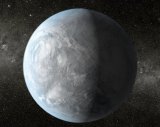NASA report prompts talk of extraterrestrial life

--NASA illustration.
“Now, he's obviously not talking about the UFO-Area-51 imaginary kind of aliens,” writes Alexis Madrigal of The Atlantic on nextgov.com. “He's commenting on the possibility that somewhere out there, on some other planet, there are the bags of chemicals we call organisms reproducing themselves."
The subject became water-cooler fodder after a gob-smacking press conference Nov. 4, when scientists announced that an analysis of Kepler Space Telescope data showed that 1-in-5 stars are orbited by Earth-sized planets in the habitable zone. NASA defines the habitable zone as the distance from a star where a planet’s surface temperature might be suitable for water.
While the Kepler is no longer operational, it provided four years of data for scientists by measuring variations in the brightness of more than 100,000 stars every 30 minutes. Scientists searched "for the tiny 'winks' in light output that happen when a planet passes in front of its star," according to NASA.
The story landed on the front pages of newspapers, on websites and on TV news shows. The Kepler results could be game changing for NASA, notes Lane Wallace of The Atlantic, also on nextgov.com.
“Gaining support for follow-on missions will be far easier with such tantalizing results arising from this one,” he writes. “With billions of possible alternate home planets, how can we not try to find out if any of them really are like us? And that tantalizing possibility offers NASA something the agency’s mission planners have been lacking in the past few years: a clear goal, target, and focus—one that the public might even get excited about.”
That’s important news. Some experts argue that China “will surpass what NASA is capable of doing in space during the next decade,” according to Eric Berger’s SciGuy Blog on the Houston Chronicle’s website.
It could happen with one too many budget cuts. “The bottom line is that NASA has done, and is doing, a lot of great stuff,” Berger writes. “But this treasured national institution is in a more perilous position, financially and politically, than I think a lot of people realize.”

